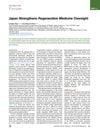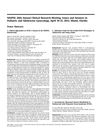 January 2023 in “Integrative Journal of Medical Sciences”
January 2023 in “Integrative Journal of Medical Sciences” A young Saudi girl with uncontrolled type 1 diabetes and hypothyroidism had two rare conditions, Mauriac syndrome and Van Wyk–Grumbach syndrome.
 July 2018 in “Plastic and Aesthetic Nursing”
July 2018 in “Plastic and Aesthetic Nursing” The 2018 ISPAN Meeting emphasized hands-on learning, patient safety, and professional growth in medical aesthetics and reconstructive practices.
[object Object]  926 citations,
June 2010 in “BMC Medicine”
926 citations,
June 2010 in “BMC Medicine” Polycystic ovary syndrome is a complex condition that affects women's mental, reproductive, and metabolic health throughout their lives.
 213 citations,
June 2017 in “Rheumatology”
213 citations,
June 2017 in “Rheumatology” The guidelines suggest a detailed approach to diagnosing and treating lupus, with a focus on regular check-ups, personalized medicine, and a range of drug options for different cases.
 34 citations,
June 2014 in “The BMJ”
34 citations,
June 2014 in “The BMJ” Pregnancy can change skin disease severity, with some conditions improving and others worsening, and treatment should balance benefits and fetal safety.
 27 citations,
September 2017 in “Acta dermato-venereologica”
27 citations,
September 2017 in “Acta dermato-venereologica” Adults with certain skin conditions may have higher levels of inflammation in their body.
 19 citations,
February 2018 in “Cell Stem Cell”
19 citations,
February 2018 in “Cell Stem Cell” Japan improved its regulation of regenerative medicine to ensure safety and prevent unproven treatments.
 19 citations,
September 2015 in “Therapeutic Delivery”
19 citations,
September 2015 in “Therapeutic Delivery” Active transdermal technologies in cosmetics help deliver skin treatments effectively, but their safety and effectiveness depend on skin type and treatment choice.
 10 citations,
January 2018 in “Seminars in Reproductive Medicine”
10 citations,
January 2018 in “Seminars in Reproductive Medicine” The document concludes that women with PCOS need a comprehensive care model that covers reproductive, metabolic, and psychological health to improve their quality of life.
 9 citations,
July 2017 in “Journal of medical case reports”
9 citations,
July 2017 in “Journal of medical case reports” Ruxolitinib treatment may cause eyelash growth.
 7 citations,
January 2019 in “Headache”
7 citations,
January 2019 in “Headache” Hormone therapy may increase migraines in transgender women and decrease them in transgender men; more research is needed on migraine management in transgender individuals.
 5 citations,
April 2013 in “Current Problems in Pediatric and Adolescent Health Care”
5 citations,
April 2013 in “Current Problems in Pediatric and Adolescent Health Care” The document concludes that early and personalized treatment for PCOS in adolescents is crucial to manage symptoms and prevent long-term health issues.
 2 citations,
December 2023 in “Health Technology Assessment”
2 citations,
December 2023 in “Health Technology Assessment” Laser treatment and deroofing are effective options for hidradenitis suppurativa.
 2 citations,
September 2010 in “Journal of the Dermatology Nurses’ Association”
2 citations,
September 2010 in “Journal of the Dermatology Nurses’ Association” Transplant patients on immunosuppressive medications have a higher risk of skin cancer, and managing this involves balancing medication with cancer risk.
 1 citations,
January 2024 in “NPJ breast cancer”
1 citations,
January 2024 in “NPJ breast cancer” Experts agree on how to manage sugar levels and skin reactions in patients taking the cancer drug alpelisib.
 October 2023 in “Paediatrics & child health”
October 2023 in “Paediatrics & child health” The document advises health care providers on how to support transgender and gender-diverse youth with appropriate care and referrals.
 July 2015 in “British Journal of Dermatology”
July 2015 in “British Journal of Dermatology” Treating skin conditions with both psychological and dermatological care improves patient outcomes and can save costs.
 November 2016 in “Elsevier eBooks”
November 2016 in “Elsevier eBooks” Genetic mutations can affect female sexual development, requiring personalized medical care.
 September 2002 in “Comprehensive Therapy”
September 2002 in “Comprehensive Therapy” Primary care is key in managing PCOS, focusing on lifestyle changes and medications like birth control and metformin.
 October 2020 in “Veterinary Dermatology”
October 2020 in “Veterinary Dermatology” New treatments and diagnostic methods for various animal skin conditions showed promising results.
 May 2023 in “Journal of Education, Health and Sport”
May 2023 in “Journal of Education, Health and Sport” Platelet-rich plasma injections can help the body heal and treat conditions like hair loss, wound healing, acne scars, erectile dysfunction, and osteoarthritis, but more research is needed.
 March 2012 in “Journal of Pediatric and Adolescent Gynecology”
March 2012 in “Journal of Pediatric and Adolescent Gynecology” Androgen levels do not determine the type of PCOS symptoms in young females.
 1 citations,
October 2022 in “Adolescent Health, Medicine and Therapeutics”
1 citations,
October 2022 in “Adolescent Health, Medicine and Therapeutics” Gender-affirming therapy can cause skin issues like acne and hair loss in transgender adolescents, and more research is needed on its dermatological effects.
 4 citations,
January 2016 in “PubMed”
4 citations,
January 2016 in “PubMed” The best way to treat androgenetic alopecia, a common type of hair loss, is through early intervention and a comprehensive approach, but some supplements may reduce the effectiveness of medical treatments.
[object Object]  2 citations,
October 2021 in “Bioinformation”
2 citations,
October 2021 in “Bioinformation” Certain gene variants are linked to a higher risk of polycystic ovary syndrome, hair loss, and obesity in women from western Saudi Arabia.
 January 2023 in “Voprosy kurortologii fizioterapii i lechebnoĭ fizicheskoĭ kultury”
January 2023 in “Voprosy kurortologii fizioterapii i lechebnoĭ fizicheskoĭ kultury” COVID-19 may cause hair loss, often after recovery, with androgenetic alopecia being the most common type.
January 2024 in “Cosmetics” Menopause worsens skin, hair, and nails, affecting self-esteem and quality of life.
 January 2019 in “Our Dermatology Online”
January 2019 in “Our Dermatology Online” Almost 40% of older men in the study had hair loss on the front and side of their legs, and most were unaware of it.
 30 citations,
January 2023 in “EFSA journal”
30 citations,
January 2023 in “EFSA journal” Adults should not consume more than 255 micrograms of selenium per day to avoid risk of hair loss and other side effects.
 6 citations,
January 2013
6 citations,
January 2013 Hyperadrenocorticism in ferrets is linked to neutering and indoor housing, and is best treated with surgery and a deslorelin implant.




























